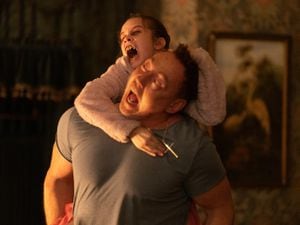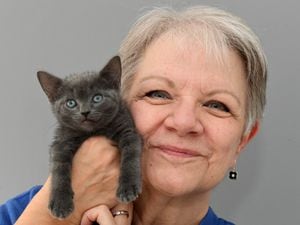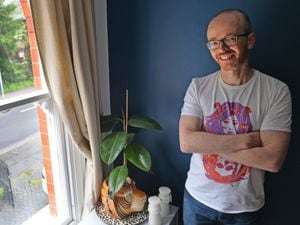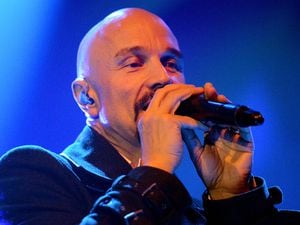Ocean Colour Scene talk about finding success ahead of gig at Wolverhampton Racecourse
There have been some pretty good West Midlands rock stories. Black Sabbath lived it large, tearing up the 1970s rock world in a blizzard of drink, drugs and girls.
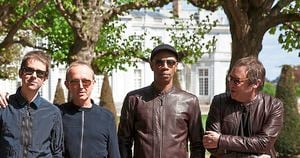
Electric Light Orchestra were another whose story seemed impossibly grandiose – fancy a gig with the Moscow Symphony Orchestra, anyone?
The 1980s were all about Duran Duran, who continue to live an improbably glamorous story of supermodels, yachts and razzle dazzle while UB40 remain part of rock’s jet set after selling 70 million records and taking reggae music from their King’s Heath bedsit to the world.
Ocean Colour Scene are another who belong among that roll call of greatest ever Midlands bands. Simon Fowler, Oscar Harrison and Steve Craddock at one point found themselves singing to 125,000 fans in a field wondering how the hell they’d managed to escape their Moseley flats.
At one stage, they were Britain’s second biggest-selling band, beaten only by their mates, Oasis. Their 1996 triple platinum album Moseley Shoals remains the go-to record for Britpop fans.
Simon Fowler, the band’s singer, still can’t believe the way things worked out. One day he was a jobbing reporter on a newspaper in Solihull, the next he was a stoner writing songs in some beat-up Brummie studio and then all of a sudden his band was the biggest thing since, well, Oasis; an overnight success after seven years in the wings.
Midlands gigs always have a special resonance for OCS – this place is, after all, their home. And they’ll return on August 31 to headline Wolverhampton Racecourse. They’ll also play two shows at Birmingham’s O2 Academy on December 13 and 14.
The Birmingham band’s story is already the stuff of legend: a rip-roaring rock’n’folk odyssey set to a backdrop of 21 years of UK pop culture at its very best.
In their 23-year existence, Ocean Colour Scene has notched up nine albums, three of which were in the Top Five – 1996’s Moseley Shoals, 1997’s Marchin’ Already and 1999’s One From The Modern – and a run of nine successive Top 20 hit singles commencing with 1996’s The Riverboat Song. They supported Oasis at their massive Knebworth shows that same year, and two years later helmed the biggest arena tour of any UK band to date. Their achievements have been nothing short of phenomenal.
In 2016 Ocean Colour Scene were playing huge sell-out shows across the country to celebrate the 20th Anniversary of their ‘Moseley Shoals’ album – including two sold-out, massive hometown shows at Moseley Park in Birmingham.
“Things have worked out alright,” laughs Simon, ironically. “Wolverhampton should be good. It’ll be a good day at the races. We did Doncaster racecourse last year and that was great. You’re on at teatime for those shows, which is quite nice, and Doncaster was a beautiful setting. I’ve never been to Wolverhampton racecourse. It’ll be fun.”
Home is enormously important to the band. Simon moved out of Birmingham some years ago – but didn’t go far. He found himself a place in a quiet Warwickshire village, where he sups ale at lunchtime in the local pub and all the locals call him Simon. Oscar wouldn’t leave Birmingham for all the tea in China. The only one who’s left the area is Steve, who lives a bucolic lifestyle in Devon where he swims in the sea and takes walks along the beach.
Simon says: “Birmingham’s our home, isn’t it. Moseley had a huge influence on us. From Oscar’s point of view, he grew up with UB40. These days, he also plays drums with The Beat. Steve has ended up with The Specials as well as us and [Paul] Weller. So we have good Midlands connections. Maybe I should join Black Sabbath?”
Or Slade. We laugh.
“Yeah, that’s right. I could be the new Noddy Holder.”
And we laugh some more.
Birmingham has changed dramatically since OCS broke out back in the 1990s. Simon remembers. “The thing about the Birmingham music scene is that it was very, very small when we were starting off. There weren’t many venues. I remember that you started off playing at the Barrel Organ and during the period that The Hummingbird was shut, the next stop was the NEC. The O2 wasn’t there. It was a strange thing. Birmingham was a place that you could easily break out of if you were any good, quite quickly. We became known very quickly. There wasn’t a lot else going on.”
OCS had a stuttering start to their career. They signed to Phfftt Records in 1990 and their debut single Sway had them labelled as the next big shoegazer/indie band. They hooked up with producer Jimmy Miller, the New Yorker who’d worked with Blind Faith, Traffic, Primal Scream and The Rolling Stones, for whom he produced Beggars Banquet, Let It Bleed, Sticky Fingers, Exile on Main Street and Goats Head Soup. But rather than make a killer record, they blew their advance in the pub.
“I don’t think we were ready the first time around. What we were ready to do was go to the pub with Jimmy. I was a bit in awe of Jimmy. He was a great drinking pal. We probably had more fun down the pub than in the studio. Eventually Jimmy got the sack. The record seemed to go on forever and by the time it came out everyone had turned on to Nirvana.”
OCS decamped to King’s Heath. They learned to write, they became great mates, they learned to produce and slowly created their magnum opus: Moseley Shoals. “We had the time to get it right. We had all the time in the world. We spent all day in the studio and all night enjoying ourselves. There wasn’t any pressure.”
Simon wrote The Riverboat Song, The Circle, The Day We Caught The Train, You’ve Got It Bad and other songs that featured on Moseley Shoals. “They just came about quite naturally. Steve was like the director of music and producer over a period of a few years.
“In those days, we knew how to enjoy ourselves. Steve had hooked up with Paul (Weller). And by the time of Moseley Shoals we all knew him because Steve was playing for him. That’s what helped us fund the studio time.
“I can’t remember all of the details. But we gradually moved into our second studio, at Five Ways, and things came together.”
The BBC DJ Chris Evans helped them take it to a new level. He made their single, The Riverboat Song, his Single Of The Week for two weeks running on the BBC One Breakfast Show. He also used it as the theme tune to TFI Friday. “Without Chris, we’d have probably charted at 33. But at the time he was hosting the Radio One morning show, which was the biggest show in town. So from being also-rans, we became an overnight success after seven years.”
And so, improbably, the man who’d led a hand-to-mouth existence found himself one of the hottest properties in town. He loved it. “It was fantastic being a pop star. I remember being chased down Richmond High Street by a bunch of school girls. I dived into WHSmith and asked to be hidden behind the counter. But I never really absorbed that. When I lived in London, I was in Richmond. I was walking round and seeing Pete Townshend, Mick Jagger and Richard Ashcroft. After a while I came back to Warwickshire, to a tiny little village, and started to lead a quieter life.
“I went to the Groucho Club once and found it immensely disappointing. On another occasion I went to the Met Bar with Damon (Albarn, from Blur). He jumped in, feet first. The bloke on the door was with a photographer from The Sun who knew him. When we went in, there was Elle McPherson and all sorts of people.”
A quieter life suited Simon, who, quite aside from his OCS achievements, is one of Britain’s greatest folk songwriters; a man whose more reflective work summons the ghosts of Nick Drake. These days, it’s country pubs, walking the dog and sitting down to write.
Simon loved the Moseley Shoals era. And he enjoyed taking the record in recent times to mark its 20th anniversary. “It helped us to realise what the album meant to so many people. A lot of them listened to it when they were still at school or university. It was the soundtrack of that era. For a lot of people, that meant so much.”
There were too many high points to remember from the blitz of Britpop. “I think the first time we got that ‘Jesus Christ’ feeling was supporting Oasis at Knebworth. We were at that point the second biggest band in England, after Oasis. We did Circle and Day We Caught the Train and the whole audience had their arms in the air. There were 125,000 people there each day. We stood there and were astonished. But I got that feeling when we played at the Symphony Hall with a string quartet. I walked on and thought I was going to cry. It was beautiful.”
The OCS of 2018 has been augmented by the addition of bassist Ray Meade, a former fan from Scotland whose first gig was OCS at Stirling Castle. “He’s so nice to work with and his brother is playing keyboards with us, Dan. It’s strange because we’ve always been almost-a-Scottish-band. The first time Ray saw us was his first gig and now he’s in the band. It’s nice.”
OCS have enjoyed a true renaissance in recent times with tours around the world, including one to Australia. But Simon is keen to kick on and start writing new songs. He doesn’t want to rest on his laurels and trade on past glories. “We’ve had the best touring we’ve had but we always need to rejuvenate as a band. If you don’t you turn into a heritage act, you become Status Quo. Paul’s (Weller) never allowed that. He rejuvenates himself. And that’s what I need to do now.”
The late 1990s were a great time commercially and creatively, a genuine peak. But OCS are a better live band in 2018 than they were back then. “I’m better at singing, Steve is the best guitar player around – though Johnny Marr and Paul might have a gripe with that. On his day, I look at Steve playing and think ‘bloody hell I wish I could do that’. And Oscar’s a great singer, bassist, pianist and drummer.”
OCS enjoyed a remarkable journey that made them one of region’s greatest ever bands. And Simon was always pretty sure they’d make it. “I knew I would do it though I must say that the success in ‘96 took us by surprise. The fact that we’re still around is more of a surprise. We’re just glad to be playing.”

